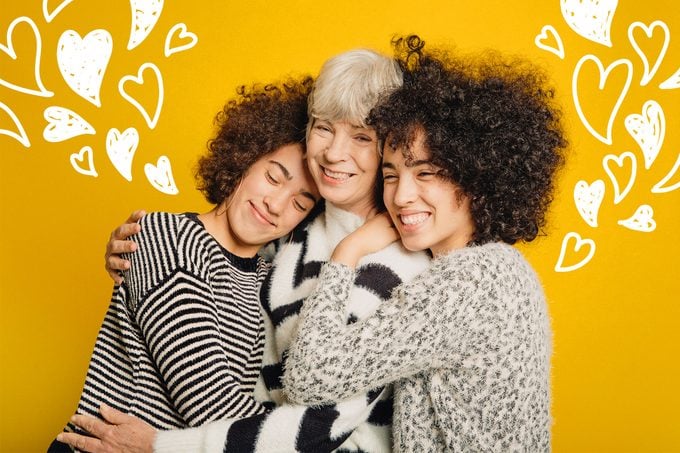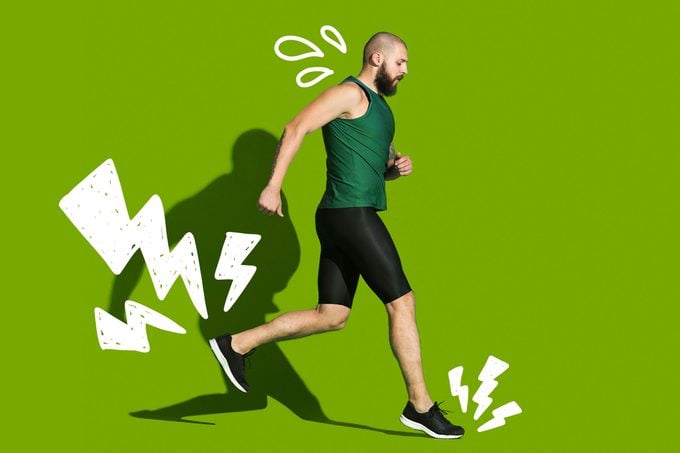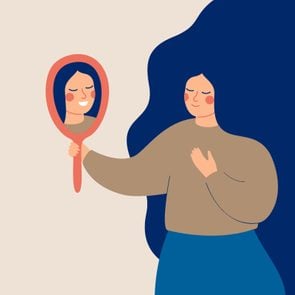How to Stop Comparing Yourself to Others for Healthier Self-Esteem
Updated: Apr. 13, 2024

Don't compare your "real" to someone else's highlight reel
My sister once sent me an Instagram reel with the message, “We should try this!” Famous. Last. Words. When will we learn how to stop comparing yourself to others, especially online? The video shows two women balancing on each other, cheerleader-style, while drinking a tasty beverage. They made it look so easy and cool. My sister and I used to do those kinds of stunts all the time—as kids. Turns out, we’re not nimble teenagers anymore, and our attempt was so hilariously catastrophic that we didn’t even bother filming it.
Thankfully, the result of my ill-advised comparison to influencers was only a few rug burns, but there have certainly been other times I’ve gotten hurt. Usually, it’s in the form of lower self-esteem, anxiety, self-criticizing and some body dysmorphia. It really stinks turning to social media to try new things and learn how to be confident in my body, only to end up feeling worse about it.
My problem? A habit of comparing. “Comparison is the thief of joy,” as they say. You’ve likely heard this popular quote before, maybe even on social media—the irony! But these days, it’s more poignant than ever, says Latasha Blackmond, author of Be You, No Filter: How to Love Yourself and Stay #SocialMediaStrong, a book about how to stop comparing yourself to others. So, how can we be better? This is what we found out.
Get Reader’s Digest’s Read Up newsletter for more life tips, humor, cleaning, travel, tech and fun facts all week long.
Why do we compare ourselves to others?
“Comparing ourselves is human nature, and in some cases, it can be a good thing, inspiring us to do better and be better,” Blackmond says. “But far too often, these comparisons become toxic to the point where your thoughts aren’t your own anymore, and one day, you realize you’re not living your own life because you’re trying so hard to live someone else’s.”
There are three types of comparisons people make, Blackmond says.
- Upward comparisons: Comparing ourselves to those we see as better and then feeling like we aren’t good enough.
- Downward comparisons: Comparing ourselves to those we see as worse and then feeling superior.
- Lateral comparisons: Comparing ourselves to our past selves or to people we see as equals as a way to make sure we’re fitting into our group.
“Evolutionarily, this makes sense, because we depended on our pack for survival,” she says. “Fitting in was a life-or-death situation.” These days, though, it’s a little less clear-cut—no lions are trying to cull the outsiders from the herd (we hope!). Unfortunately, the urge to compare yourself can still feel just as necessary.
Comparison in the age of social media

One hundred years ago, if you wanted to compare yourself to another person, you looked to your peers or those around you. Sixty years ago, you might have added television and movie stars and magazine models to that list. But about 20 years ago, with the explosion of social media, you have the opportunity to compare yourself to nearly every person on the planet, 24/7. And that’s a lot of pressure, says Tanisha M. Ranger, PsyD., a licensed clinical psychologist in Las Vegas.
Because of the highlight-reel nature of social media, much of the content we are consuming leaves us with false impressions of others’ lives, successes, homes, style and more. In fact, one study published in Media Psychology found that comparing yourself to other people on social media can not only be detrimental to your mental health, but also to your confidence, self-esteem, well-being and body image.
“Basically, social media is comparison on steroids,” she says.
When comparing yourself is harmful
“Not all comparisons are a bad idea,” Ranger says. “Healthy competition is a great motivator to improve.” For instance, positive, healthy comparison can be a useful way to find inspiration, define your non-negotiables and set goals. Comparing past versions of yourself to your current state may also shed light on the ways in which you’ve grown or remind you of meaningful things you may have lost sight of.
“The problem becomes when you are tying your intrinsic human value to where you come out, or how you stack up, in these comparisons,” she says. “Over time, you are doing a great deal of damage to yourself.”
More often than not, she says, people tend to use comparisons as a battering ram to beat themselves up. “This is especially true for women,” Ranger adds. “We are targets of whole billion-dollar industries whose entire success is dependent upon women being unhappy with ourselves in some way. The beauty industry, the fashion industry, the diet industry, the wedding industrial complex—it’s never ending. These negative comparisons are exacerbating mental illnesses and negatively impacting physical health.”
How to stop comparing yourself (in a bad way)
Feeling bad about your comparison habit? Don’t stress; heaven knows you don’t need one more thing to feel bad about! It takes a boost of confidence and emotional strength to learn how to stop comparing yourself. Instead, here are some expert tips to nix toxic comparisons and refocus your energy on positive things.
Find your tribe

Remember that comparison is human nature. However, you can choose who you’re comparing yourself to, Blackmond says. Build a healthy community. “Cultivate a tight group of friends and family, people who you admire and trust and who you know want you to be the best version of yourself,” she says.
Action tip: While making good friends is often easier said than done, one top tip to find like-minded folks is to join a class, a group or find a hobby geared toward people who share that same interest. This could be a book club, a mom’s group, a cooking seminar, a fitness class or anything in between. Just be mindful not to compare your efforts to others there—you’re all learning at your own rate.
Go offline
“Go touch grass” is a popular internet saying for “It’s time for a digital detox.” But the joking comment makes a good point. The outside world is a physical reminder that there are so many things more important than our waistlines, clothing or bank account.
Action tip: If you find yourself caught in a comparison spiral, turn off your laptop or phone and go take a walk outside. The sunshine, fresh air and movement will boost natural endorphins in your brain while you get an important shift in perspective.
Get a reality check
Have you noticed how rarely, if ever, you see someone (IRL) who truly looks like the Instagram models or TikTok stars you scroll past? Photo and video editing tools are rampant these days, and they are really good—to the point that many people can’t spot the Photoshop work. And even if they’re not editing their content, social media users (myself included!) are known to only post the best pictures or fun anecdotes, even though that is certainly not reality.
This likely isn’t new information for you, so why is it so hard to remember it at the moment when you’re comparing your wardrobe, makeup or skin to that of influencers on your phone? Or as you compare your kids to your cousin’s, thanks to her latest post? Our brains immediately process what we see, and our cognitive minds are a little slower to catch up, Blackmond says.
Action tip: Look for video tutorials on how editing works—and how to spot it. Consume all online media (including things from family and friends) with a healthy dose of skepticism. This goes for non-digital encounters as well. “You really don’t know what’s going on in other people’s lives,” Blackmond says.
Do a mind-body scan
Mindfulness is the practice of calming your mind and tuning in to your body and feelings, learning to be present in this very moment. It’s a powerful antidote to comparison, Ranger says, because comparing yourself to someone else relies on a “before” and “after.” If you’re focused on your present, you won’t be able to think about comparisons. Mindfulness that brings you in touch with your body can help you learn to feel centered in who you are, just as you are, and can help you feel grateful for all the parts of yourself.
Action tip: Easier said than done, right? Mindfulness (and its companion, meditation) are learned skills that you can get better at by practicing. Set aside 5 to 15 minutes each day and do your own mindfulness exercises, or start with a short guided meditation.
Ditch toxic relationships
Just like your loved ones can be a powerful force in helping you feel good about yourself, some toxic relationships can take a real toll on your self-esteem. Avoid friends or family who are constantly negative or comparing themselves (whether it’s upward or downward) to you or to other people, Blackmond says.
Action tip: Start with a conversation about why you don’t appreciate the comparisons and ask them politely to stop. Many people are so conditioned to compare themselves, they may not even realize they’re doing it. But if the behavior continues, even after you’ve asked them to stop, it may be time to create a little distance or, in severe situations, cut them off.
Improve your healthy habits

Prioritize exercise and eating healthy (more fruits and vegetables, less sugar and processed foods). It turns out that all those things that are good for your heart are also good for your head, Blackmond says. Plus, taking care of your body is a loving act of kindness and will help you appreciate your body more, counteracting negative comparisons.
Action tip: Do some movement just for yourself, whether that’s a fitness class, afternoon walk or a group sport that looks fun. Instead of punishing runs or ultra competitive tennis leagues, perhaps try dancing or martial arts. Yoga is designed to increase the mind-body connection and cultivate feelings of gratitude for yourself and others as well. Or pick another goal that may help you care for your body, such as drinking more water or cooking all your meals for one week.
Stop trash talking other people (yes, even celebrities)
Gossip can be seen as a form of bonding through the sharing of juicy information, but it is a rude conversation habit that takes a serious toll on not just the person being talked about but also the people sharing the gossip, Blackmond says. “Any time you offer harsh comparisons or judgments of someone else, you’re telling yourself that those things are valid for you too,” she says. It can feel good at the moment to look at unflattering pictures of a celebrity, or judge your neighbor’s house as you walk by, but your brain will register those types of comparisons and make them automatic.
Action tip: Make a conscious effort to stop judging others internally or verbalizing any comparisons or negative comments.
Learn self-compassion
Self-esteem isn’t something that just happens—it’s built up and torn down every day by how we choose to talk to ourselves, Ranger says. “Self-compassion is the act of relating to yourself in an understanding and caring way, in the same way you would treat your closest friend if they were struggling similarly,” she says. “Turning away from harsh self-criticism and toward self-kindness positively impacts the way you feel about yourself.”
Action tip: When you catch yourself looking in the mirror too harshly or judging something about your mind, body or personality, stop the thought in its tracks and reframe it from a more compassionate point of view. For instance, instead of thinking, “Why is Ashley always so put together at school pickup, and I’m just a hot mess?” try “Ashley looks great, I love her outfit! I love my outfit too, it’s so comfortable and after a long night up with sick kids, comfort is what I needed today.”
Curate your social media feed
Online comparisons are the most insidious because it’s so easy to compare yourself quickly to so many people—and many of them are promoting very unrealistic standards of beauty and living, Blackmond says. This is why it’s important to be very picky about who you follow and listen to online (and who your children follow).
Action tip: Take a one-week break from all social media and see how you feel. If your self-image improves, and you are comparing yourself less, take that as a sign you should limit your app use. Another option is to go through your feed and unfollow or unfriend any accounts that don’t uplift you. Steer clear of accounts that make fun of others or ones that simply don’t leave you feeling better.
Develop a gratitude practice
Practicing gratitude has immense physical, mental and emotional benefits—one of which is learning how to stop comparing yourself. “Actively focusing on the things for which we are grateful has proven benefits to psychological well-being and reduces that innate desire to compare,” Ranger says. Finding things to be grateful for makes you less likely to compare upward because you’re happy with what you have and less likely to compare downward because you don’t feel the need to be better than someone else.
Action tip: Read daily gratitude quotes. Or make an actual written list in a gratitude journal. Add to it daily—all the things you’re grateful for, big or small. “This has a powerful effect in banishing toxic negative comparisons,” Ranger adds.
About the experts
- Latasha Blackmond is the author of Be You, No Filter: How to Love Yourself and Stay #SocialMediaStrong. She is a highly regarded consultant, strategist and speaker with 14 years of experience in communications, law and social media best practices.
- Tanisha M. Ranger, PsyD., is a licensed clinical psychologist in Las Vegas. She has been a therapist working in a variety of clinical settings for more than a decade.
Source:
- Media Psychology: “A Meta-Analysis of the Effects of Social Media Exposure to Upward Comparison Targets on Self-Evaluations and Emotions”



